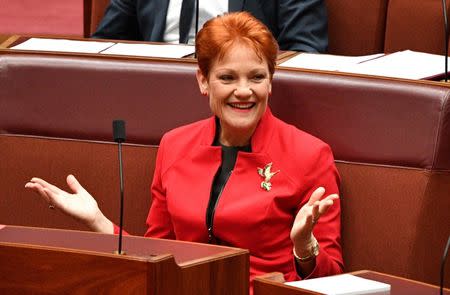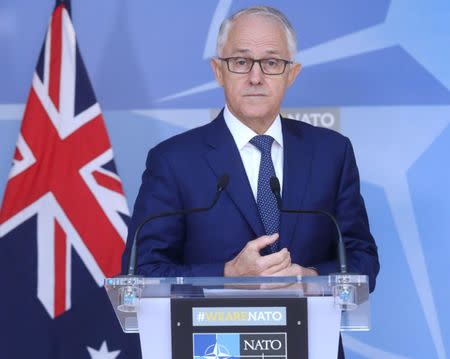Australia $106-billion income tax cuts seen boosting PM re-election bid
By Colin Packham
CANBERRA (Reuters) - Australia passed a A$144 billion (80.57 billion pounds) package of income tax cuts on Thursday after right-wing leader Pauline Hanson backed the legislation, potentially boosting the re-election prospects of the centre-right government.
Taking a page from a tax overhaul in the United States, Australia's seven-year plan to cut personal income taxes is aimed at boosting the economy and delivering a political victory for Prime Minister Malcolm Turnbull.
The bill had been stalled in the finely balanced parliament before Hanson, leader of the nationalist One Nation party, broke the impasse.
"I've actually now decided to support the government in the tax cuts which the Australian people need," Hanson told reporters in the capital, Canberra.
"It was the only fair thing to do," she added.
The passage of the bill was good news for Turnbull's coalition, which trails the opposition Labor Party in opinion polls ahead of a likely general election early next year.
The government has struggled to implement its tax policy, including corporate tax cuts which remain on hold.
"It is the most significant victory in Turnbull's tenure and will give him a real boost as we approach an election," said Haydon Manning, a political science professor at Flinders University.
Hanson, who was re-elected in 2016 largely with support from low-income earners, had previously said the government could not afford the tax package.
Opposition parties had sought to break Turnbull's tax policy into three components, in order to pass income tax cuts for low and middle-income earners, while rejecting benefits that would flow to higher earners.
MARKETS SUBDUED
There was little reaction from Australian financial markets as the package will require seven years to implement and it was uncertain if future governments would rescind parts of the bill.
, said the package would have little immediate impact.
"Because the macroeconomic aspect of the tax measures is negligible in the near term and it doesn't have any implications for interest rate settings domestically, I doubt it would have an impact in the Australian dollar either," said Matthew Hassan, senior economist at Westpac Banking Corp.
Speaking to reporters in Canberra, Turnbull said a strong economy had allowed his government to cut income taxes.
Turnbull has been dogged in recent months by a scandal over his deputy's personal life, which threatened to divide the coalition government, and a diplomatic row with China that could hurt exports to Australia's largest trading partner.
Turnbull's political fortunes got a boost this week when an opinion poll suggested his popularity had reached a two-year high. His government, however, trailed the opposition Labor party in the survey.
(Reporting by Colin Packham in Canberra; Additional reporting by Paulina Duran in SYDNEY; Editing by Darren Schuettler)

 Yahoo News
Yahoo News 

